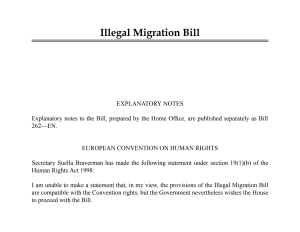by Dr Kathryn Allinson, the Law School University of Bristol,
The Illegal Migration Bill was presented to Parliament this week, proposing to ‘prevent and deter unlawful migration’. It will do so by obligating the Home Secretary to detain and remove anyone who arrives in the UK irregularly whilst denying them access to asylum procedures and appeals. The only exception is unaccompanied children and those to whom removal would cause ‘serious and irreparable harm’. However, the Bill will not deter people from coming to the UK. Instead, the provisions of the Bill, if enacted, would place asylum-seekers in prolonged administrative limbo and result in legal challenges before the European Court of Human Rights (ECrtHR).
People enter the UK irregularly, that is without official permission from the authorities, because there are almost no safe and legal routes to seek asylum here. The only schemes available are limited to Ukrainians, Afghans and some individuals from Hong Kong. Last year, only 22 Afghans were resettled under the Afghan scheme. A lack of safe routes does not deter individuals from entering the UK but forces them to take more dangerous routes. Whilst numbers of irregular arrivals by small boats has increased since 2018, the real numbers of asylum applications has risen more gradually. This demonstrates a rerouting of how people enter the UK toward more dangerous and irregular means as legal options have diminished.
This is evident in the inability of the 2022 Nationality and Borders Act, which criminalised asylum-seekers and gives powers to deport those who enter irregularly, to stop small boat crossings. Rather, the number is set to rise again this year. Similar plans enacted in Australia to deter irregular entry were also ineffective. In the 12 months after their introduction in 2001, the numbers of small boat arrivals increased to the highest in Australian history. No one has been sent offshore since 2012. The policies have been subject to persistent legal challenges with one resulting in the Australian government paying more than $70 million in compensation to the 1,000 people it had illegally detained on Manus Island. The latest detention regime has cost over £5.5 billion and 150 people are still held in Nauru.
If greater deterrence does not work and individuals continue to arrive irregularly in the UK, the Government’s plan prohibits the granting of asylum, creating an effective asylum ban. The Government instead instead plans to forcibly remove arrivals to one of the 57 safe countries outlined in Clause 5 of the Bill regardless of any protection, human rights or judicial review claims.
The problem is enforced removals are difficult to implement. The Government would need to be able to remove these individual somewhere. Home Office data shows, and UNHCR verifies, that most people who enter the UK irregularly are refugees and we can assume this will continue to be the case. As such, they cannot be returned to their home country and Clause 5 of the Bill prevents this. The Government therefore needs to secure agreement from a third country to take them. Currently, only Rwanda has agreed to this. The agreement signed between the UK and Rwanda concerns removal of 200 asylum seekers for which the government has paid £120 million. Last year, 45,755 people entered the UK in small boats.
This leaves thousands stuck in limbo in the UK. They will be unable to claim asylum, they will not be able work and the Government will not, in practice, be able to remove them. They may be detained indefinitely or, if released, they may be provided some minimal state support. It is this reality that sees the Bill called ‘inhumane’ and ‘disastrous’.
Despite this, the UK Parliament has absolute law-making power. Whatever it enacts will become law, even where it acknowledges elements are not compatible with the European Convention on Human rights (ECHR). In the Explanatory Note to the Bill, the Home Secretary used section 19(1)(b) of the Human Rights Act to do just that, asking Parliament to proceed despite the likely incompatibility. The Government acknowledges, by employing s19(1)(b), the likelihood of challenges before the ECrtHR.
Legal challenges will likely relate to the right to private and family life (Article 8), the prohibition of degrading, inhuman treatment (Article 3), protection from slavery and servitude (Article 4), the right to liberty (Article 5) and the right to an effective remedy (Article 13). The Bill also breaches the UK’s fundamental obligations, under the 1951 Refugee Convention, not to penalise asylum seekers for their mode of entry (Article 31) and risks breaching the obligation not to send them to a country where they risk torture (Article 33). Further, Clause 49 of the Bill enables the Home Secretary to ‘make provisions’ if the ECrtHR issues interim measures. This would most likely amount to overruling or ignoring them, in breach of Article 34 of the ECHR, which would be in direct breach of the UK’s treaty obligations.
Given the Government has made a negative s 19 statement, there is little doubt that they are aware that the provisions set out in the Bill will be subject to very strong legal challenges before the ECrtHR. This could result in the issuance of interim measures and potentially lead to a direct breach of a treaty obligation, should the Home Secretary act to ignore these. This will lend weight to calls to leave the ECHR, undermining the human rights protections available for everyone within the UK. It will also enable the Government to claim the failures of their policies stem from the restrictions placed on them by the Strasbourg Court, not by the inadequacy of the plans themselves.
If the Government is serious about reducing irregular migration to the UK and deaths in the Channel, they need to create safe routes in the form of humanitarian visas, expanded resettlement schemes and family reunification initiatives. Greater deterrence mechanisms, as set out in the Illegal Migration Bill, will only push individuals into greater irregularity and undermine the protections of human rights available to all.

